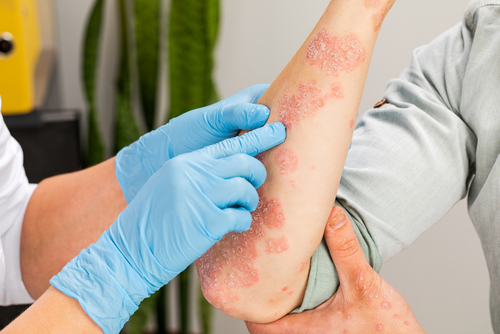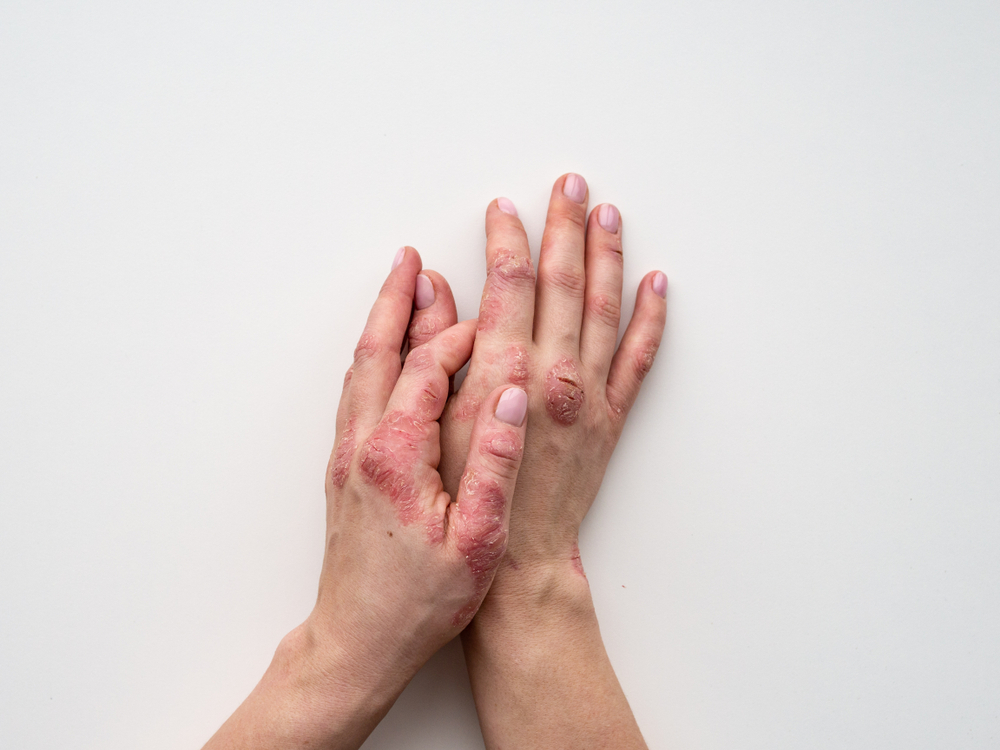 Psoriasis is a chronic skin condition that can interfere with daily activities, make sleeping uncomfortable, and produce unsightly rashes and sores that itch, burn, and bleed. The condition can also alter chemicals like serotonin in the brain, increasing risks for depression.
Psoriasis is a chronic skin condition that can interfere with daily activities, make sleeping uncomfortable, and produce unsightly rashes and sores that itch, burn, and bleed. The condition can also alter chemicals like serotonin in the brain, increasing risks for depression.
Plaque psoriasis, the most common type, often appears on the scalp, lower back, elbows, and knees, but other types can impact the trunk, arms and legs, palms, soles of the feet, and even toe and fingernails. While most people only experience one type of psoriasis at a time, it is possible to have more than one type concurrently, and up to 30 percent of people with psoriasis are at risk of developing psoriatic arthritis, a condition marked by swelling of tendons and joints, general stiffness, and increasing fatigue.
There is no cure for psoriasis, but various methods can treat flare-ups. The correct treatment for your needs will depend on your type of psoriasis, how much of your body has been impacted, the length of time you have had the condition, and what other treatments you have tried. The best way to determine which psoriasis treatment is right for you is with a consultation and evaluation with board-certified dermatologist Dr. Steven Greene.
Psoriasis Treatments
Topical medications are often the first line of treatment for psoriasis. This may include OTC remedies such as products containing aloe vera, coal tar, and salicylic acid, along with prescription medications containing corticosteroids, retinoids, and calcineurin inhibitors. Some of these, such as retinoids, may also be administered via injection to treat psoriasis.
In addition to retinoid injections, other oral and injectable medications commonly used to treat psoriasis include cyclosporine, methotrexate, biologics, and steroids. These may be administered daily, weekly, or monthly and can be used to support other treatments, such as topical ointments and gels.
Dr. Greene is Here to Help
If you have psoriasis, help is available. Please call Advanced Dermatology and Laser Center of Seattle at 206-402-4797 to schedule a consultation and learn more. Dr. Greene is a board-certified dermatologist serving Mercer Island, Redmond, Bellevue, and all nearby areas of Washington.

 Psoriasis is technically an autoimmune disease, and mostly thought to be caused by a combination of genetics and environmental factors. Autoimmune diseases occur when your body’s immune system overreacts and attacks healthy cells. When it comes to
Psoriasis is technically an autoimmune disease, and mostly thought to be caused by a combination of genetics and environmental factors. Autoimmune diseases occur when your body’s immune system overreacts and attacks healthy cells. When it comes to